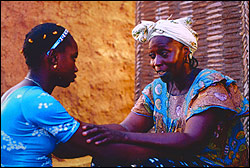The Cannes Film Festival smash hit Moolaadé (which runs Friday, Feb. 18–Thursday, Feb. 24, at the Varsity) is the most important film in town right now, but not because it’s about an Important Subject. It’s about female genital mutilation, a stupid, wicked custom practiced in most African nations, but it’s not really an issue film, any more than Bad Education is a priest-abuse film or Boogie Nights a porn-agitprop sermon. These movies are great because they don’t argue abstract issues; they give them life in gripping dramas about flesh-and-blood people artfully depicted in the complex web of their society, by a director with a distinct auteurial signature, wit, psychological subtlety, and an absolute mastery of style.
If you shy away from seeing it because you expect to be bored or lectured to, you’re a fool. And don’t fear, as I did, that the grisly subject will prove too upsetting to witness—legendary Senegalese director Ousmane Sembene skillfully conveys the horror without visual overkill. He does orchestrate tension as well as a horror director, but you’ll leave the theater with a sense of triumph, not despair.
His charismatic heroine is Collé (Fatoumata Coulibaly), the second wife of a respected tribesman who’s off on a long business trip. Collé has no Western feminist objections about the power structure of her home: She has authority over her own daughter, Amsatou (Salimata Traoré), but defers to her husband’s first wife, and coexists quite peacefully with her husband’s third, junior wife and their kids. They keep their little domestic courtyard in a small Burkina Faso village as neat as a pin. Sembene gives us an insider’s sense of the village’s physical structure that would gladden the eagle eye of film-critic-turned-artist Manny Farber. We get to know our way around, to glimpse the way the mosque apes the shape of the anthill in the village square, and grasp the significance of the lovely geometric echoes. The anthill contains the spirit of the village’s ancient founding father, whose animist religion is contained within the merely centuries-old new religion, Islam. (Which, incidentally, does not mandate female genital mutilation, a far older African custom.)
And when the village women get wind of threatening new ideas via their beloved radios, the male elders confiscate them and make an auto-da-fé between the mosque and anthill. The smoking pyramid of radios forms a third edifice, and we get the idea that yet another ideology has entered an ancient and ongoing fray.
What prompts the radio crackdown is Collé’s defiance of the red-clad “Exciseuses,” women who grab little girls to slice off their clitorises with unsterilized knives and no anesthesia. Few grown-ups protest, since no girl can expect a husband unless she is thus “purified.” Some terrified girls flee to probable doom in the city, or kill themselves, or simply die from the procedure. Collé’s own purification so damaged her privates that she lost two kids in childbirth. She later forbade the Exciseuses’ blades from touching Amsatou, now grown-up and engaged to the hunky town prince, who’s about to come back from Paris to claim his bride.
Gossips squawked about Collé’s dissent, but villages tolerate their eccentrics. Not, however, if they challenge society at large. When four girls escape the Exciseuses and take refuge in Collé’s house, she invokes the more powerful spirit of Moolaadé to protect them. The killer clitorectomists can’t cross the magical rope Collé strings across her courtyard entryway, a symbol of the Moolaadé’s power and authority. Curses! Foiled again.
Meanwhile, the village elders consult religious authorities about this knotty problem: How can the village respect the tradition Collé invokes without threatening those traditional practices she challenges? Her rabble-rousing brother-in-law riles up the animist/Islamic right against her and, when her sympathetic husband comes home, shames him into action. Soon the entire village is in an uproar—on all sides of the issue. Everyone pressures Collé to revoke the Moolaadé curse, so that peace and order may prevail.
As octogenarian Sembene expertly builds tension, Moolaadé combines the virtues of The Lottery and High Noon. Collé won’t budge, and everybody has an opinion. Only the itinerant village merchant (the remarkably magnetic Dominique T. Zeïda), a cosmopolitan, charmingly womanizing veteran of the army’s United Nations peacekeeping force, dares to voice open support for Collé. Will he be made to pay? Will Amsatou’s urbane fiancé renounce brutish superstition? And what will become of the cowering girls in Collé’s courtyard?
None of these tensions seems remotely foreign. Sembene takes us past our own outsider’s morally privileged vanity and inside the hearts of the villagers, both male and female. In its grand ambition, you might think the movie qualifies as what Farber dismissed as “elephant art,” the self-conscious moral epic masterpiece. It does, but Moolaadé also works as Farber’s preferred kind of movie, the more kinetic, less pretentious “termite art” film that “nails down one moment without glamorizing it.” Sembene nails down an entire society in a series of immortally ordinary moments worthy of Satyajit Ray, with the regular-guy (or gal!) heroism of Howard Hawks.








